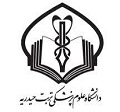(2021) Iranian healthcare professionals' knowledge, attitudes, and use of complementary and alternative medicine: a cross sectional study. BMC Complement Med Ther. p. 244. ISSN 2662-7671
|
Text
Iranian_healthcare_professionals_knowledge_attitu (1).pdf Download (983kB) |
Abstract
BACKGROUND: The present study aims to investigate the knowledge, attitude, and performance of Iranian Healthcare Professionals (HP) about Complementary and Alternative Medicine (CAM) modalities. METHODS: This cross-sectional study was carried out on 210 HP in 2019. Samples were selected from healthcare centers, clinics, and hospitals using census sampling. Data collection tools included demographic information, attitude, knowledge, and the amount of use of CAM modalities. Data analysis was performed using SPSS ver. 24. RESULTS: In this study, the response rate was 85.3 (n=209). A majority of respondents had a positive attitude toward CAM (n=166, 79), but their level of knowledge was limited (n=154, 73.6). The most commonly used CAM modalities were herbal medicine (93.2), exercise therapy (75.4), and hydrotherapy (75.2), respectively, and the least commonly used ones were magnetic therapy (2.9) and hypnosis (4.8). The most important reasons for the use of CAM modalities by HP included fewer side effects than medical treatments (57.4), its lowest cost than medical treatments (34.9), non-serious disease with no need for referral to a clinic (32.1), and its more convenient access than medical treatments (30.6). The results showed that there was a significant relationship between the education level and the use of CAM modalities (p<0.05). There was also a significant relationship between the suggestion of CAM modalities and the amount of use of these modalities, and those who used these modalities would also have recommended them to their clients more frequently (p<0.05). CONCLUSION: The results showed that most of HP used at least one of the CAM modalities and had a positive attitude towards CAM. As the level of knowledge was limited, training courses should be implemented to increase health practitioner's level of knowledge on CAM.
| Item Type: | Article |
|---|---|
| Keywords: | Attitude; Behavior; CAM; Health care personnel; Knowledge. |
| Page Range: | p. 244 |
| Journal or Publication Title: | BMC Complement Med Ther |
| Volume: | 21 |
| Number: | 1 |
| Identification Number: | https://doi.org/10.1186/s12906-021-03421-z |
| ISSN: | 2662-7671 |
| Depositing User: | پریسا مرادی |
| URI: | http://eprints.thums.ac.ir/id/eprint/3480 |
Actions (login required)
 |
View Item |



